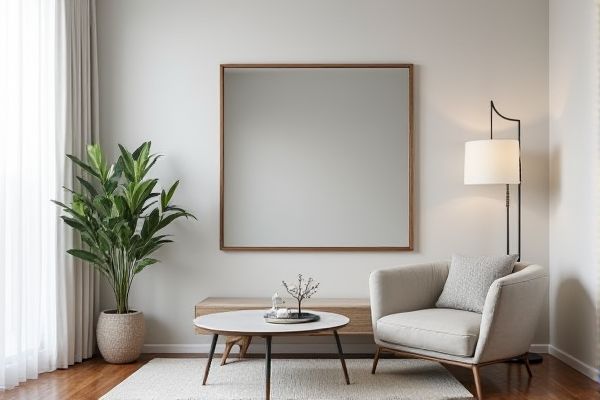
Frameless mirrors offer a sleek, modern look that seamlessly blends into any space, making them ideal for minimalist interiors, while framed mirrors provide a decorative border that enhances the design and adds character to your room. Discover which mirror style best suits your taste and needs by exploring the rest of this article.
Table of Comparison
| Feature | Frameless Mirror | Framed Mirror |
|---|---|---|
| Design | Minimalist, sleek, modern appearance | Classic, decorative, customizable styles |
| Installation | Direct wall mounting, simpler hardware | May require additional support for frame |
| Durability | Vulnerable edges, requires careful handling | Frame protects edges, generally more robust |
| Maintenance | Easy to clean, no frame to collect dust | Frame requires regular dusting, polishing |
| Cost | Usually lower due to no frame costs | Often higher due to frame materials and design |
| Customization | Limited to size and shape of glass | Wide options for frame styles, colors, materials |
Introduction to Frameless and Framed Mirrors
Frameless mirrors offer a sleek, modern look characterized by clean edges and minimal visual distractions, enhancing the sense of space and light in a room. Framed mirrors, in contrast, provide decorative borders that can complement various interior styles, adding texture and color to the decor. Choosing between frameless and framed mirrors depends on the desired aesthetic impact and the functional role within the space.
Design Aesthetics: Frameless vs Framed Mirrors
Frameless mirrors offer a sleek, modern look that seamlessly blends with any decor, emphasizing minimalism and open space. Framed mirrors, available in a variety of materials like wood, metal, or plastic, provide a defined boundary that enhances traditional, rustic, or eclectic design styles. The choice between frameless and framed mirrors significantly impacts the room's visual appeal by either promoting simplicity or adding character through detailed borders.
Materials Used in Frameless and Framed Mirrors
Frameless mirrors are typically made from high-quality polished glass edges or beveled finishes that emphasize a clean, modern aesthetic without added materials. Framed mirrors incorporate materials such as wood, metal, or plastic, offering structural support and decorative appeal that can vary from rustic to contemporary styles. The choice of materials in framed mirrors allows for customization in color, texture, and durability, which contrasts with the sleek simplicity and minimalism prioritized in frameless designs.
Space and Size Considerations
Frameless mirrors create an illusion of a larger space by seamlessly blending into the wall, making them ideal for small or compact areas. In contrast, framed mirrors add visual weight and can serve as a focal point, which might overwhelm limited spaces but enhance larger rooms. Your choice between frameless and framed mirrors should consider the scale and proportions of your room to optimize both aesthetics and spatial perception.
Installation Differences
Frameless mirrors require precise wall preparation and mounting hardware to ensure a secure and flush installation, often using adhesive or clips that remain discreet. Framed mirrors provide structural support through their frame, allowing for easier hanging with standard hooks or brackets. The installation time for frameless mirrors tends to be longer due to the need for exact alignment and careful handling to avoid damage.
Durability and Maintenance
Frameless mirrors typically offer easier maintenance due to the absence of frame edges where dust and moisture can accumulate, reducing the risk of mold or corrosion. Framed mirrors, often constructed with wood or metal, provide enhanced durability and structural support but may require regular upkeep such as polishing or sealing to prevent frame deterioration. Choosing between the two depends on balancing the need for low-maintenance surfaces with long-term durability based on the material and environmental conditions.
Cost Comparison: Frameless vs Framed
Frameless mirrors typically cost less due to minimal materials and simpler installation, making them a budget-friendly choice for modern or minimalist interiors. Framed mirrors often require additional materials, such as wood, metal, or decorative elements, increasing both the upfront price and potential maintenance costs. You can save money with frameless designs while framed mirrors offer more customization and style options that might justify the higher expense.
Suitability for Different Room Types
Frameless mirrors offer a sleek, modern look ideal for minimalist or contemporary spaces such as bathrooms and small apartments where clean lines create the illusion of more space. Framed mirrors suit traditional or eclectic rooms, adding character with diverse frame materials like wood or metal, making them perfect for living rooms or bedrooms that benefit from decorative accents. Your choice depends on the room's style and function, balancing aesthetics with spatial dynamics for optimal visual impact.
Pros and Cons of Frameless Mirrors
Frameless mirrors offer a sleek, modern aesthetic that enhances your space by creating an illusion of openness and minimalism, making them ideal for small rooms or contemporary designs. They are easier to clean without a frame trapping dust or grime but may require more careful installation and handling due to their exposed edges, which can be prone to chipping or damage. Your choice depends on whether you prioritize a clean, unobstructed view and a lightweight design or prefer the added protection and style versatility that framed mirrors provide.
Pros and Cons of Framed Mirrors
Framed mirrors offer enhanced durability and style options, providing a decorative border that complements your room's aesthetic and protects the edges from damage. The added frame can make installation easier and add visual interest, but it may also increase the overall weight and cost compared to frameless mirrors. Your choice depends on whether you prioritize a sleek, minimalist look or a more detailed, traditional design with added protection.
 homyna.com
homyna.com